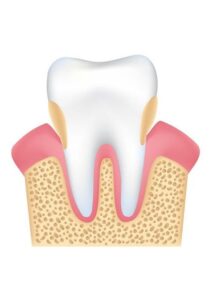 Gingivitis can occur around dental implants as well as natural teeth. Recent research indicates that gingivitis around an implant may be more difficult to reverse over time. Therefore, it is important to identify gingivitis early on so effective treatments can be performed to eradicate the plaque and bacteria that cause infection.
Gingivitis can occur around dental implants as well as natural teeth. Recent research indicates that gingivitis around an implant may be more difficult to reverse over time. Therefore, it is important to identify gingivitis early on so effective treatments can be performed to eradicate the plaque and bacteria that cause infection.
At Harmony Dental Care in Jackson, MS, Dr. Kalil Abide can design a plan to treat periodontal issues and help you maintain optimal oral health before you undergo dental implant surgery to replace missing teeth. Here, we discuss dental implants and gingivitis, and what you can do to address the problem.
What Causes Dental Implant Gingivitis?
Also known as peri-implant mucositis, implant gingivitis occurs in much the same way as gingivitis around a natural tooth. In both cases, plaque accumulates along the gum line and can affect the tissues surrounding the titanium post.
The Importance of Routine Dental Examinations and Cleanings
Gingivitis and periodontal disease occur more frequently in patients who do not attend routine dental examinations and cleanings. These preventative measures not only help the doctor monitor your overall oral health, they also keep oral bacteria levels at a safe level.
On average, bacteria repopulate about every six months. For this reason, the majority of dental patients see their hygienists at six-month intervals. However, people who are genetically predisposed to periodontal issues may need more frequent cleanings to keep bacteria at bay.
Treatments for Dental Implant Gingivitis
Patients experiencing inflammation around a dental implant can benefit from a debridement. Similar to a routine cleaning, the clinician will carefully clean around the implant, removing plaque deposits and tartar. Special titanium hand instruments will be used in this process to make sure the implant is not damaged in any way.
Antibiotic therapy may also be utilized, depending on the case. Oral antibiotics may be prescribed, or the medication may be administered locally into the gums to treat the infection at its source.
Another common treatment includes the use of Chlorhexidine, a prescription antibacterial mouth rinse. Chlorhexidine should be used as directed by your dentist to keep the area of concern clean and free of contaminants.
Proactive Treatment is Key
As is the case with most oral health issues, early detection plays a significant role in the treatment of implant gingivitis. If left untreated, peri-implant mucositis can evolve into peri-implantitis. When this occurs, the hard and soft tissues surrounding the dental implant become damaged. Pockets can form around the titanium post as the infection causes jawbone deterioration, resulting in a loose implant.
Once the condition reaches this point, surgical intervention will be required. A bone grafting procedure can be completed in an attempt to stabilize the implant. However, if this treatment is unsuccessful, the implant will need to be removed, and several months of healing will need to occur before another implant can be placed.
If you notice redness, inflammation, or tenderness around a dental implant, do not postpone dental care. By seeing your dentist right away, you are giving yourself the best chance for a successful outcome and a healthy, long-lasting smile.
Contact Harmony Dental Care to Find Out More
Dental implants are currently the most successful teeth replacement option on the market. If you notice any signs of problems concerning your dental implant, schedule an appointment with Dr. Abide. You can call us at (601) 713-1923 or contact us online anytime.